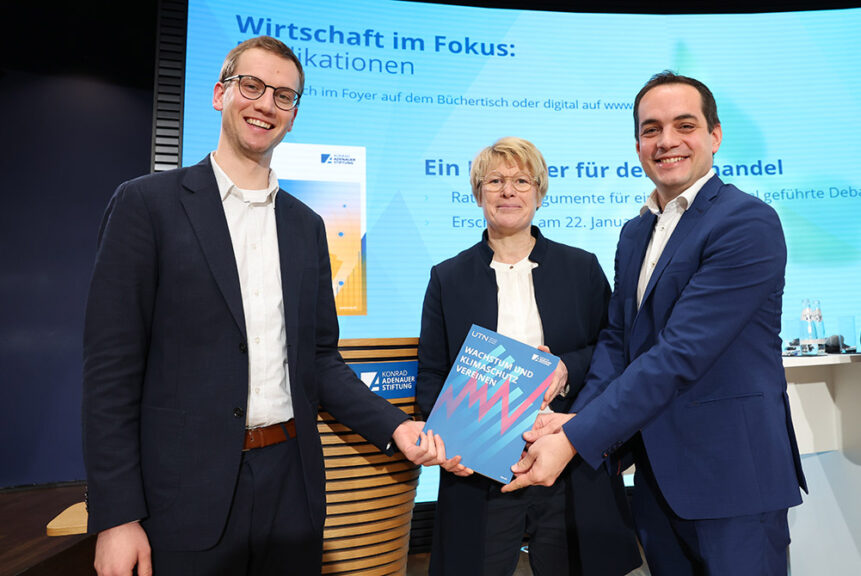Economic growth and climate protection are not opposing forces – this is the conclusion drawn by Prof. Dr. Veronika Grimm, Dr. Christian Sölch, and Johannes Wirth from the University of Technology Nuremberg in their recently published study, titled “Aligning growth and climate protection”, which was commissioned by the Konrad Adenauer Stiftung.
The study shows that the deliberate renunciation of economic growth, so-called ‘degrowth’, does not promote climate protection in Germany. On the contrary, the deindustrialisation of Germany or the European Union would significantly limit the ability to make an effective contribution to global climate protection. It is crucial that economic growth and climate protection are driven forward together.
The study shows that innovation in particular drives growth and climate transformation, secures jobs and living standards and enables Europe to play an active role in shaping global climate protection. Deindustrialisation, on the other hand, would tend to jeopardise progress in climate protection and weaken the continent’s global influence.
Creating stable framework conditions for climate protection and growth
In order to combine a growth agenda and effective climate protection, the authors argue that a clear political framework is required, in particular consistent pricing of CO₂ emissions, the development of infrastructure and, above all, international cooperation on the basis of binding common regulations. At the same time, they emphasise that the growth potential in Germany must also be strengthened beyond this, for example through pension and labour market reforms, a strengthening of the education system and a strengthening of capital market integration that facilitates the financing of the transformation.
The study is available online via the Konrad Adenauer Stiftung.

Economic growth and climate protection are not opposing forces – this is the conclusion drawn by Prof. Dr. Veronika Grimm, Dr. Christian Sölch, and Johannes Wirth from the University of Technology Nuremberg in their recently published study, titled “Aligning growth and climate protection”, which was commissioned by the Konrad Adenauer Stiftung.
The study shows that the deliberate renunciation of economic growth, so-called ‘degrowth’, does not promote climate protection in Germany. On the contrary, the deindustrialisation of Germany or the European Union would significantly limit the ability to make an effective contribution to global climate protection. It is crucial that economic growth and climate protection are driven forward together.
The study shows that innovation in particular drives growth and climate transformation, secures jobs and living standards and enables Europe to play an active role in shaping global climate protection. Deindustrialisation, on the other hand, would tend to jeopardise progress in climate protection and weaken the continent’s global influence.
Creating stable framework conditions for climate protection and growth
In order to combine a growth agenda and effective climate protection, the authors argue that a clear political framework is required, in particular consistent pricing of CO₂ emissions, the development of infrastructure and, above all, international cooperation on the basis of binding common regulations. At the same time, they emphasise that the growth potential in Germany must also be strengthened beyond this, for example through pension and labour market reforms, a strengthening of the education system and a strengthening of capital market integration that facilitates the financing of the transformation.
The study is available online via the Konrad Adenauer Stiftung.